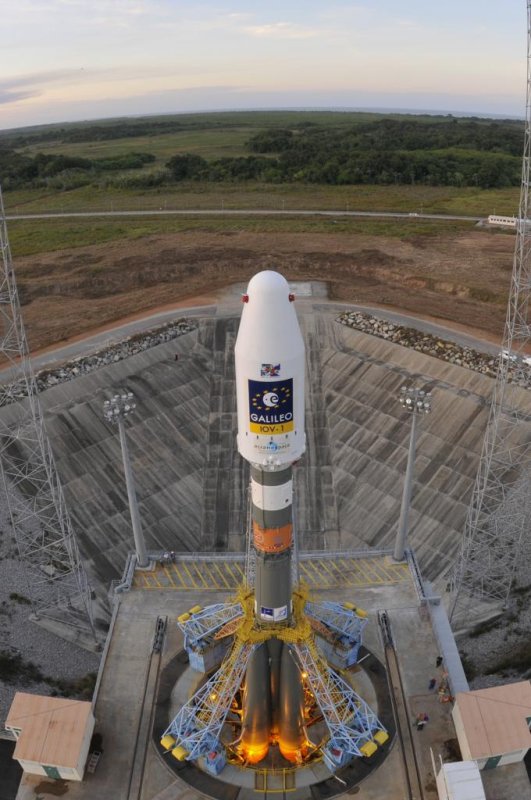A Soyuz rocket with its payload awaits launch. (ESA photo: S. Corvaja)
KOUROU, French Guiana, Aug. 25 (UPI) -- Europe's effort to establish a GPS satellite constellation has a problem -- its first fully operational satellites were launched into an incorrect orbit.
According to Arianespace, which sent the satellites aloft last week aboard a Russian-designed rocket, the two Galileo spacecraft are more than 1,700 miles from where they should be above Earth.
"The liftoff and first part of the mission proceeded nominally, leading to release of the satellites according to the planned timetable, and reception of signals from the satellites," Arianespace said. "It was only a certain time after the separation of the satellites that the ongoing analysis of the data provided by the telemetry stations operated by the European Space Agency and the French space agency CNES showed that the satellites were not in the expected orbit."
The circular orbit planned for the Galileo satellites was inclined at 55 degrees, with a semi major axis of about 18,000 miles. Instead, the spacecraft were put in an elliptical orbit with an incline off 49.8 degrees and a semi-major axis of about 16,280 miles.
Scientists and engineers of Arianespace, ESA and other organizations believe the miss was caused by an anomaly with the upper stage of the Soyuz rocket that left the Arianespace launch pad in French Guiana last Friday.
Investigations into the cause of the incorrect orbit and how, if possible, the satellites can be saved are now taking place.
"Our aim is of course to fully understand this anomaly," said Stéphane Israël, chairman and chief executive officer of Arianespace. "Everybody at Arianespace is totally focused on meeting this objective.
"... Arianespace, in association with ESA and the European Commission, will designate an independent inquiry board to determine the exact causes of this anomaly and to draw conclusions and develop corrective actions that will allow us to resume launches of Soyuz from the Guiana Space Center in complete safety and as quickly as possible.
"Arianespace is determined to help meet the European Union's goals for the Galileo program without undue delay," he said.
The European Space Agency said the two satellites are being safely controlled and operated from its operations center in Germany.















